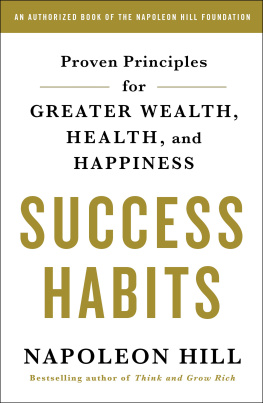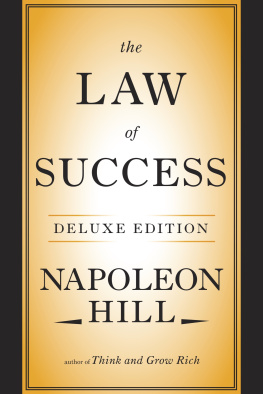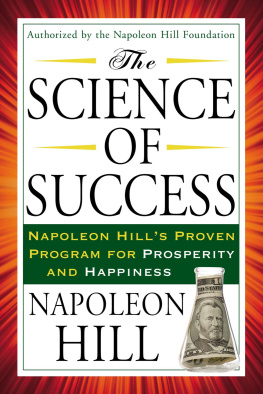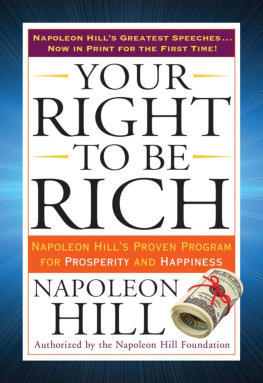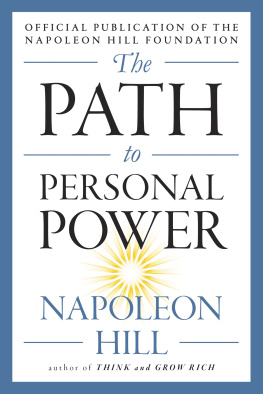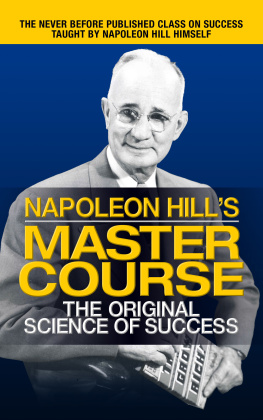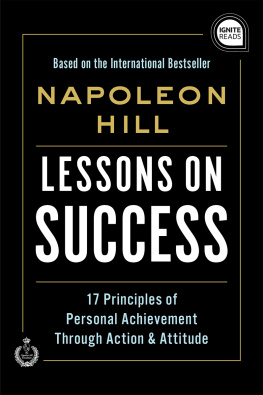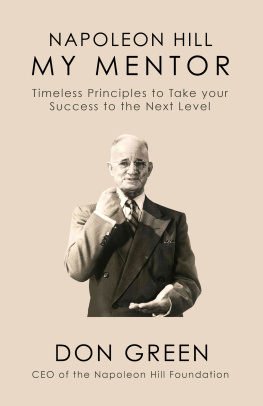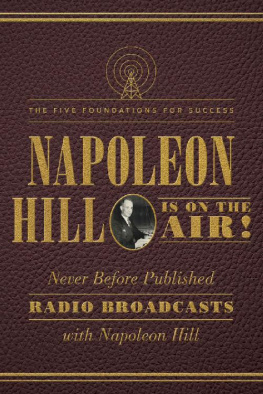Contents
Guide
Pagebreaks of the print version

The author and publisher have provided this e-book to you for your personal use only. You may not make this e-book publicly available in any way. Copyright infringement is against the law. If you believe the copy of this e-book you are reading infringes on the authors copyright, please notify the publisher at: us.macmillanusa.com/piracy.
A young magazine reporter from the mountains of southwest Virginia, Napoleon Hill was assigned to interview American steel magnate Andrew Carnegie. Mr. Carnegie was impressed with young Napoleons intelligence and ambition, and at the end of the three-day interview Mr. Carnegie asked him if he would devote twenty years of his life, without pay, to researching and writing the first book ever on the philosophy of success developed and applied by Americas leaders. With some trepidation but little hesitation, Napoleon said yes and assured Mr. Carnegie he would not only begin the project but he would complete it.
Complete it he did, and twenty years after that 1908 interview, Napoleon Hill published his first book, titled Law of Success . It was followed in 1937 by what became the best-selling success book of all time, Think and Grow Rich . Napoleon went on to publish many more motivational books and lectured extensively throughout the United States in succeeding decades. He was enjoying semi-retirement in the 1950s, in his late-sixties, when Chicago insurance tycoon W. Clement Stone urged the by then Dr. Hill to present a number of radio and television lecture programs. Always desirous of teaching his success principles to new audiences, he accepted and put on several such programs throughout America.
Dr. Hill and his wife established the Napoleon Hill Foundation in 1962, intending that it would continue to teach his principles after he was gone. He died in 1970, and the Foundation they established continues to carry on to this day, spreading his principles throughout the world in scores of languages. I have been a trustee of the Foundation since 1997, and its executive director since 2000.
A few years ago I came across the dusty tapes and transcripts of several of Dr. Hills radio and television lecture programs that had been tucked away in the Foundations archives. They had never been published. Foundation trustees were thrilled to have the opportunity to resurrect them, and thus was born the Napoleon Hill Is on the Air series of books. The book you are holding is one in that series, a transcription of weekly radio programs presented in 1952 in Paris, Missouri.
How did Napoleon Hill come to give a series of radio interviews in the small town of Paris, Missouri? The answer illustrates one of his seventeen principles of success developed in his twenty years of research: the principle is that every adversity carries with it the seed of an equivalent advantage. Dr. Hill had put on a seminar in St. Louis, Missouri, a large city on the Mississippi River, which had turned out to be unprofitable. More money was spent promoting it than was received in attendance fees. However, a longtime follower of Dr. Hill, Bill Robinson, a businessman in Paris, Missouri, was in the audience, and was inspired to invite Dr. Hill to put on a series of lectures in Paris.
Paris at that time was a town of only 1,400 people. It is located in rural northeastern Missouri, on the central fork of the Salt River, far from any major metropolitan areas. St. Louis, the nearest large city, is approximately 135 miles away. Young people were leaving Paris for greater employment opportunities in bigger cities. Robinson was worried about the decline of the town, and arranged to have nearly 100 townspeople attend the series of lectures over several weeks. They would be broadcast on local radio, and Dr. Hill would receive $10,000. There were skeptics in Paris who thought the lectures would be little more than a medicine show, but Dr. Hill soon won them over with his powerful messages.
Following these inspirational broadcasts, many Paris citizens banded together in discussion groups. A local minister presented a series of sermons based upon Dr. Hills teachings. A number of new businesses, as many as ten by one account, sprouted in this small town as a direct result of the lectures. A year after the broadcasts, Dr. Hill said that an elderly Paris resident told him that nothing had come to that community within the past fifty years which had made such a profound impression on so many of the people as had been made by the teaching of my philosophy.
A movie titled A New Sound in Paris was made, documenting the changes that were brought about in that small community by Dr. Hills lectures. It was seen by hundreds of thousands of people and helped to spread the success principles taught by Dr. Hill. Unfortunately, it appears to have been lost to history.
Napoleon Hill loved Paris. It was wholesome small-town America. Mark Twain had been born nearby, in Florida, Missouri, and his books reflected the Midwestern culture of honesty, determination, and hard work. Beloved American artist Norman Rockwell painted a famous picture of the bustling local newspaper office in Paris in 1946 that appeared in the Saturday Evening Post . The wandering Salt River, with its three forks, beautified the area and ultimately poured into the Mighty Mississippi. One fork passed under one of the few covered bridges ever built in Missouri.
Napoleon Hill once said, The path of least resistance makes all rivers, and some men, crooked. That phrase aptly describes the meandering Salt River. Fortunately, thanks in some part to Napoleon Hills efforts, it does not describe the men and women of Paris, who worked hard to avoid that path and to make their lives, the lives of their families, and their community successful and happy.
As you read this book, the first and only publication of these radio lectures, you will encounter some men who followed the path of least resistance, but Dr. Hill will show you the way to reject this path by the application of his principles of success.
The lectures concentrated on a few of the seventeen success principles, ones that Dr. Hill believed would be especially helpful to the people of Paris. The first two dealt with Definiteness of Purpose, viewed by many Hill followers as the most important of the laws of success. The next two focused on the importance of Accurate Thinking. The next two explained how Applied Faith was necessary to the attainment of success. The next two dealt with the Causes of Failure and how to overcome them with persistence and decisiveness. The ninth showed how Self-Discipline was essential to success. The next two dealt with the importance of a Pleasing Personality to achieving success. The final two dealt with Cosmic Habit Force, the only one of the seventeen principles of success that Dr. Hill claimed had not been recognized by anyone before he discovered it.
In the lectures on Definiteness of Purpose, Dr. Hill explained how the laws of nature reflect a definite purpose and plan. He detailed the nine basic motives that propel people to carry out their plans and accomplish their purposes. In the Accurate Thinking lectures, Dr. Hill explained the difference between inductive and deductive reasoning and showed how to separate important facts from the unimportant. He detailed how people should challenge the opinions and statements of others by asking the simple question How do you know? Falsehoods, he said, came with warning notes. He listed the enemies of accurate thinking, perhaps most importantly the emotions, concluding that Accurate thinking is cold-blooded thinking.

